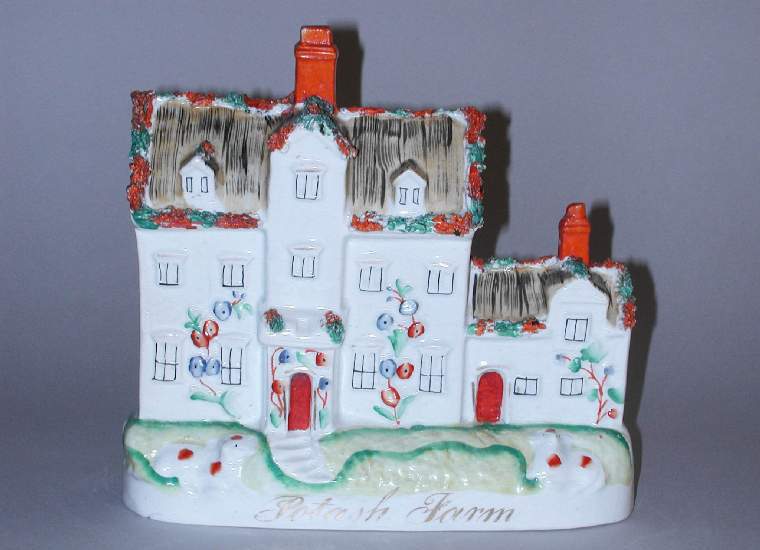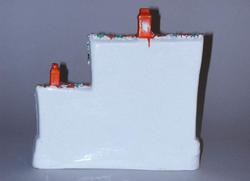Current Location: Gallery 27 (Glaisher)
Titles
Potash Farm
Maker(s)
Production:
Unidentified factory
Entities
Categories
Description
White earthenware model building moulded in three parts, with small shards of clay added to decorate. Painted with black, brown, blue, green, buff and orange-red enamels, and gilt.
The oval base is flattened at the back; the front is inscribed ‘Potash Farm’ in gilt script. The top of the base is moulded and painted to suggest lawn, with a small flight of steps and two reclining animals. The model is well coloured. The three storey house has twelve windows, arranged symmetrically around a red front door; red and blue flowers wind around the door and climb up the front of the house. The thatched roof is painted in a combed pattern of buff and brown; roughly edged in green and orange-red shards; and topped by a red chimney. There is a low extension to the viewer’s right, with a similar roof and chimney, three windows and a red door. Except for the chimneys, the back and sides are unpainted. The underside is concave and glazed, with an arrow-shaped vent hole in the middle. The back is flat.
Notes
History note: Mr Levine at Norwich. Bought on 25 May, 1918, with model of Stanfield Hall, for £3.10/- (£3 ten shillings) the pair, by Dr Glaisher, Trinity College, Cambridge. Dr Glaisher notes that this ‘was very cheap. For I have been asked more that this for Potash Farm alone’.
Legal notes
Dr. J.W.L. Glaisher Bequest, 1928
Measurements and weight
Depth: 7 cm
Depth: 2.75 in
Height: 20.5 cm
Height: 8.5 in
Width: 21.5 cm
Width: 8.5 in
Place(s) associated
Acquisition and important dates
Method of acquisition: Bequeathed
(1928)
by
Glaisher, J. W. L., Dr
Dating
19th Century, Mid
Victorian
Production date:
circa
AD 1849
Note
Potash Farm was the home of James Blomfield Rush, who murdered his landlord, Isaac Jermy, the Recorder of Norwich, following a dispute over Rush’s £5,000 mortgage. On 28 Nov 1848, Rush went to Jermy's home, Stanfield Hall, shot Jermy and his son dead, and wounded his daughter-in-law and a housemaid. Rush was hanged at Norwich Castle on 21 April 1849.
Rackham (1935) lists this figure as of a type made chiefly by Sampson Smith at Longton, a factory listed in contemporary directories as a ‘manufacturer of figures in great variety’, which began around 1851 and continued to make figures in quantity into the early part of the twentieth century. Sampson Smith figures typically have a flat back and plain oval base, often with a gilt script title, although the decoration with shards of clay would be unusual for their figures. Meanwhile, there were many other manufacturers of figures working in Staffordshire at this time.
The trial was widely reported. ‘The Illustrated London News’ carried an engraving of Stanfield Hall on 8 December 1848, and of Potash Farm on 31 March 1849. This model is a pair to a model of Stanfield Hall, which is also in the Fitzwilliam collection; a further companion piece, Norwich Castle, has also been identified. The date of the trial and execution indicate that the set was made in 1849. The Farm and Hall appear in several variations, which shows both their popularity and that they were made by several factories. In addition to the three model buildings, figures were made of Rush and his mistress, Emily Sandford. Together they form a potter’s narrative of the event.
School or Style
Victorian
People, subjects and objects depicted
Components of the work
Decoration
composed of
enamels
( black, brown, blue, green, buff and orange-red)
gold
Materials used in production
White earthenware
Lead-glaze
Techniques used in production
Press-moulding
: White earthenware moulded in three parts, with small shards of clay added to decorate. Painted with black, brown, blue, green, buff and orange-red enamels, and gilt. The underside is concave and glazed, with an arrow-shaped vent hole in the middle. The back is flat.
Lead-glazing
Inscription or legends present
Inscription present: the front is inscribed ‘Potash Farm’ in gilt script
- Text: Potash Farm
- Location: Front of base
- Method of creation: Painted in gilt
- Type: Title
Inscription present: Rectangular paper label, handwritten in black script
- Text: No.4138. Staffordshire model of Potash Farm where J B Rush lived, who murdered Mr Jermy at Stanfield Hall in 1848. b. at Norwich, May 25, 1918
- Location: Underside of base
- Method of creation: Handwritten in black ink
- Type: Label
References and bibliographic entries
Identification numbers
Accession number: C.1015B-1928
Primary reference Number: 71143
Old object number: 4139
Stable URI
Audit data
Created: Saturday 6 August 2011
Updated: Tuesday 30 April 2024
Last processed: Saturday 22 March 2025
Associated departments & institutions
Owner or interested party:
The Fitzwilliam Museum
Associated department:
Applied Arts





